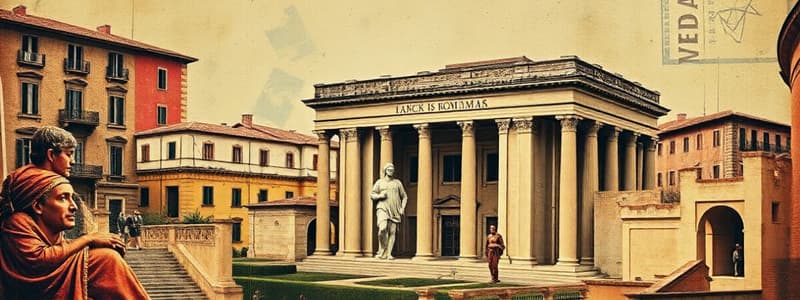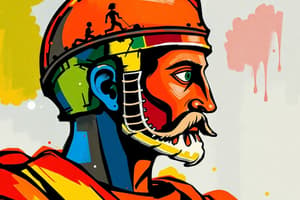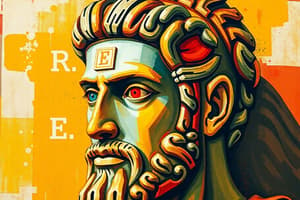Podcast
Questions and Answers
Octavian Augustus was the first Roman ______.
Octavian Augustus was the first Roman ______.
emperor
The term Pax Romana refers to the Roman ______ during the reign of Augustus.
The term Pax Romana refers to the Roman ______ during the reign of Augustus.
peace
The common coinage introduced by Augustus was the silver ______.
The common coinage introduced by Augustus was the silver ______.
denarius
Agriculture was the most important ______ in ancient Rome.
Agriculture was the most important ______ in ancient Rome.
The 2nd century AD marked the end of Pax Romana and the beginning of a ______ in the Roman Empire.
The 2nd century AD marked the end of Pax Romana and the beginning of a ______ in the Roman Empire.
Trade was disrupted, leading to problems in the ______ of the Empire.
Trade was disrupted, leading to problems in the ______ of the Empire.
The lack of fertile soil and poor harvests caused ______ shortages.
The lack of fertile soil and poor harvests caused ______ shortages.
Diocletian divided the Empire into the ______ and East sectors.
Diocletian divided the Empire into the ______ and East sectors.
Constantine moved the capital from Rome to ______.
Constantine moved the capital from Rome to ______.
The last Roman Emperor, ______ Augustulus, was unable to protect the Empire.
The last Roman Emperor, ______ Augustulus, was unable to protect the Empire.
The city of Rome was established on seven rolling ______.
The city of Rome was established on seven rolling ______.
Romulus and Remus were raised by a she-______ and a woodpecker.
Romulus and Remus were raised by a she-______ and a woodpecker.
The area known for fertile land and raw materials is the ______ Peninsula.
The area known for fertile land and raw materials is the ______ Peninsula.
The Etruscans influenced the development of Rome through advanced trading and ______ models.
The Etruscans influenced the development of Rome through advanced trading and ______ models.
The Roman Kingdom lasted from 753 to 509 ______.
The Roman Kingdom lasted from 753 to 509 ______.
The Roman citizens overthrew Tarquin the Proud, establishing a ______.
The Roman citizens overthrew Tarquin the Proud, establishing a ______.
The ______ held significant power and consisted of 300 members representing the upper class.
The ______ held significant power and consisted of 300 members representing the upper class.
Plebian leaders sought power-sharing with ______, instigating conflict for equality.
Plebian leaders sought power-sharing with ______, instigating conflict for equality.
Plebian representatives elected to protect their rights were known as ______.
Plebian representatives elected to protect their rights were known as ______.
The establishment of ______ was a significant step in creating a formal legal code for all free citizens.
The establishment of ______ was a significant step in creating a formal legal code for all free citizens.
Carthage was a major rival of Rome, especially during ______, which were conflicts between the two powers.
Carthage was a major rival of Rome, especially during ______, which were conflicts between the two powers.
Scipio was a leader representing ______ during the Punic Wars.
Scipio was a leader representing ______ during the Punic Wars.
The main causes of the Punic Wars included control of the ______ and freedom in Carthage.
The main causes of the Punic Wars included control of the ______ and freedom in Carthage.
The Minoan Civilization was located on the island of ______.
The Minoan Civilization was located on the island of ______.
The most influential city-states in Ancient Greece included ______, Sparta, Corinth, and Thebes.
The most influential city-states in Ancient Greece included ______, Sparta, Corinth, and Thebes.
The Trojan War was a significant event for the ______ civilization.
The Trojan War was a significant event for the ______ civilization.
The ______ served as a fortified hilltop used as a refuge during wars.
The ______ served as a fortified hilltop used as a refuge during wars.
The ______ was the center of the city where public meetings took place.
The ______ was the center of the city where public meetings took place.
Greek city-states could be led by a single person known as a ______.
Greek city-states could be led by a single person known as a ______.
Men called ______ typically governed by a small group of wealthy nobles.
Men called ______ typically governed by a small group of wealthy nobles.
In Sparta, the assembly of all people was referred to as the ______.
In Sparta, the assembly of all people was referred to as the ______.
The rulers who seized control and supported the common people in city-states were known as ______.
The rulers who seized control and supported the common people in city-states were known as ______.
Athenian democracy is defined as a government ruled by the ______.
Athenian democracy is defined as a government ruled by the ______.
The political reformer ______ outlawed debt slavery in Athens.
The political reformer ______ outlawed debt slavery in Athens.
In Athens, girls were primarily educated at ______.
In Athens, girls were primarily educated at ______.
Pericles aimed to strengthen Athenian ______ as one of his main goals.
Pericles aimed to strengthen Athenian ______ as one of his main goals.
The Trojan War was fought between the Mycenaeans and the independent trading city of ______.
The Trojan War was fought between the Mycenaeans and the independent trading city of ______.
The Greeks revolted against Persian rule in the region known as ______.
The Greeks revolted against Persian rule in the region known as ______.
The Persian king ______ led an army to Greece to punish the Athenians.
The Persian king ______ led an army to Greece to punish the Athenians.
The Persian army was famously defeated at the Battle of ______.
The Persian army was famously defeated at the Battle of ______.
The Greeks wanted to retrieve ______, who was kidnapped by Trojan prince Paris.
The Greeks wanted to retrieve ______, who was kidnapped by Trojan prince Paris.
The Persian army was led by ______.
The Persian army was led by ______.
The most famous Spartan leader during the Battle of Thermopylae was ______.
The most famous Spartan leader during the Battle of Thermopylae was ______.
The alliance formed by several Greek city-states against the Persians is known as the ______ League.
The alliance formed by several Greek city-states against the Persians is known as the ______ League.
The Greeks were ultimately able to rid their territory of Persian rule at the Battle of ______.
The Greeks were ultimately able to rid their territory of Persian rule at the Battle of ______.
The cultural blending that occurred after Alexander the Great's conquests is known as ______ culture.
The cultural blending that occurred after Alexander the Great's conquests is known as ______ culture.
The large ______ of the Roman Republic led to difficulty in governance.
The large ______ of the Roman Republic led to difficulty in governance.
Discontent among the lower classes was due to their feeling of being ______.
Discontent among the lower classes was due to their feeling of being ______.
Farmers were forced to sell their land to ______ landowners due to debts.
Farmers were forced to sell their land to ______ landowners due to debts.
The increased reliance on ______ labor by landowners contributed to the economic issues.
The increased reliance on ______ labor by landowners contributed to the economic issues.
Many soldiers faced financial hardship because they had no support after their ______.
Many soldiers faced financial hardship because they had no support after their ______.
The Gracchus brothers proposed land reforms to aid the ______ of Rome.
The Gracchus brothers proposed land reforms to aid the ______ of Rome.
Julius Caesar expanded the Senate and implemented reforms including jobs for the ______.
Julius Caesar expanded the Senate and implemented reforms including jobs for the ______.
The first Triumvirate shared power among Crassus, Pompey, and ______.
The first Triumvirate shared power among Crassus, Pompey, and ______.
Civil war broke out due to the unresolved ______ in the Republic.
Civil war broke out due to the unresolved ______ in the Republic.
After Caesar's assassination, a second civil war led to the rise of ______ as an unchallenged ruler.
After Caesar's assassination, a second civil war led to the rise of ______ as an unchallenged ruler.
The Etruscans had their own ______ system.
The Etruscans had their own ______ system.
During the Roman Kingdom period, there were seven ______.
During the Roman Kingdom period, there were seven ______.
Patricians were the ______ class in ancient Rome, having many rights and holding office positions.
Patricians were the ______ class in ancient Rome, having many rights and holding office positions.
The Assembly of all people was one of the main ______ in the Roman state organization.
The Assembly of all people was one of the main ______ in the Roman state organization.
Tarquinius Priscinus built temples and ______ during his reign.
Tarquinius Priscinus built temples and ______ during his reign.
Flashcards
Pax Romana
Pax Romana
A period of relative peace in ancient Rome, starting with Augustus's reign.
Roman Emperor
Roman Emperor
The supreme ruler of Rome, often with military authority.
Civil Service
Civil Service
Government workers who managed Roman affairs.
Denarius
Denarius
Signup and view all the flashcards
Decline and Fall of the Roman Empire
Decline and Fall of the Roman Empire
Signup and view all the flashcards
Trade disruption
Trade disruption
Signup and view all the flashcards
Diocletian's reform
Diocletian's reform
Signup and view all the flashcards
Constantine's move
Constantine's move
Signup and view all the flashcards
Barbarian invasions
Barbarian invasions
Signup and view all the flashcards
Romulus Augustulus
Romulus Augustulus
Signup and view all the flashcards
Italian Peninsula
Italian Peninsula
Signup and view all the flashcards
Rome's Seven Hills
Rome's Seven Hills
Signup and view all the flashcards
Romulus and Remus
Romulus and Remus
Signup and view all the flashcards
Who were the Etruscans?
Who were the Etruscans?
Signup and view all the flashcards
Ancient Rome's Timeline
Ancient Rome's Timeline
Signup and view all the flashcards
Roman Republic
Roman Republic
Signup and view all the flashcards
Consuls
Consuls
Signup and view all the flashcards
Senate
Senate
Signup and view all the flashcards
Magistrates
Magistrates
Signup and view all the flashcards
Patricians vs. Plebeians
Patricians vs. Plebeians
Signup and view all the flashcards
Tribunes
Tribunes
Signup and view all the flashcards
Twelve Tables
Twelve Tables
Signup and view all the flashcards
Punic Wars
Punic Wars
Signup and view all the flashcards
Monarchy
Monarchy
Signup and view all the flashcards
Aristocracy
Aristocracy
Signup and view all the flashcards
Oligarchy
Oligarchy
Signup and view all the flashcards
Tyrant
Tyrant
Signup and view all the flashcards
Citizen in Ancient Greece
Citizen in Ancient Greece
Signup and view all the flashcards
Debt Slavery
Debt Slavery
Signup and view all the flashcards
Solon's Reforms
Solon's Reforms
Signup and view all the flashcards
Pericles' Goals
Pericles' Goals
Signup and view all the flashcards
Ancient Greece's Geography
Ancient Greece's Geography
Signup and view all the flashcards
Minoan Civilization
Minoan Civilization
Signup and view all the flashcards
Mycenaean Civilization
Mycenaean Civilization
Signup and view all the flashcards
Greek Dark Age
Greek Dark Age
Signup and view all the flashcards
Greek Colonization: Reasons
Greek Colonization: Reasons
Signup and view all the flashcards
Trojan War
Trojan War
Signup and view all the flashcards
Persian Wars
Persian Wars
Signup and view all the flashcards
Revolt in Ionia
Revolt in Ionia
Signup and view all the flashcards
Battle of Marathon
Battle of Marathon
Signup and view all the flashcards
Miltiades
Miltiades
Signup and view all the flashcards
Etruscan Influence
Etruscan Influence
Signup and view all the flashcards
Roman Forum
Roman Forum
Signup and view all the flashcards
Roman King's Power
Roman King's Power
Signup and view all the flashcards
Senate in the Kingdom
Senate in the Kingdom
Signup and view all the flashcards
Roman Social Classes
Roman Social Classes
Signup and view all the flashcards
Delian League
Delian League
Signup and view all the flashcards
Peloponnesian War
Peloponnesian War
Signup and view all the flashcards
Hellenistic Culture
Hellenistic Culture
Signup and view all the flashcards
Who conquered Greece after the Peloponnesian War?
Who conquered Greece after the Peloponnesian War?
Signup and view all the flashcards
Landless Soldiers
Landless Soldiers
Signup and view all the flashcards
Spartacus
Spartacus
Signup and view all the flashcards
Gracchi Brothers
Gracchi Brothers
Signup and view all the flashcards
Gaius Marius
Gaius Marius
Signup and view all the flashcards
Triumvirate
Triumvirate
Signup and view all the flashcards
Julius Caesar
Julius Caesar
Signup and view all the flashcards
Octavian
Octavian
Signup and view all the flashcards
Problems of the Republic
Problems of the Republic
Signup and view all the flashcards
Causes of the Crisis
Causes of the Crisis
Signup and view all the flashcards
Civil War
Civil War
Signup and view all the flashcards
Study Notes
Roman Emperor Octavian Augustus
- The first Roman emperor
- The unchallenged ruler of Rome
- Titles: Augustus = "exalted one", Imperator = "supreme military commander" / emperor
- The reign of Octavian Augustus started the period of relative peace in Rome → Pax Romana = Roman peace
Reforms
- Set up civil service
- Affairs of the government were managed by paid officials
- Common coinage was introduced
- Silver denarius
- Trading became easier
Industry
- The most important industry was agriculture
Trade
- The Romans developed trade with the provinces and other countries
Society
- People from all over the world lived in the empire
- Higher classes lived in luxury
- Lower classes were poor and unemployed
- Slavery was a significant part of Roman life
- Slaves were working in the households as servants or in the fields
- Slaves were entertaining citizens of Rome as trained fighters - Gladiators
Decline and Fall
- The 2nd century AD
- The end of Pax Romana
- The crisis started and the Empire declined
Studying That Suits You
Use AI to generate personalized quizzes and flashcards to suit your learning preferences.




